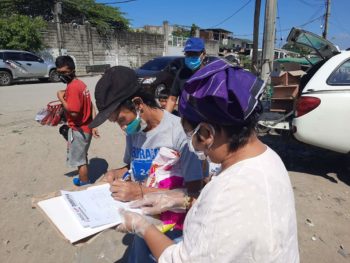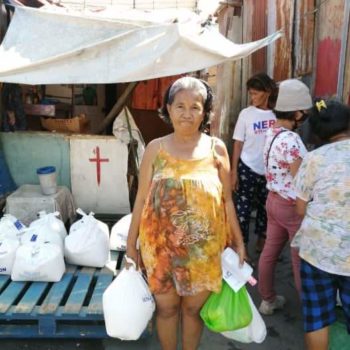ACT Alliance member the National Council of Churches in the Philippines (NCCP) has launched a response to support 300 households of the Navotas community who had been affected by lockdowns to stop the spread of COVID-19. NCCP distributed food and hygiene kits to the vulnerable families to help them weather this pandemic.
In response to the COVID-19 pandemic, the government of the Philippines implemented a 30-day enhanced community quarantine in Luzon, the country’s largest and most populous island, starting on March 14th. The enhanced community quarantine period has since been extended to April 30th and continues to be enforced by police officers and military personnel.
The lockdown has required businesses, markets, and transportation to suspend their services, while food and other essential services continue to be regulated by the government. For the duration of the lockdown, each family is issued a ‘quarantine pass’, allowing just one person to leave their home at a time to purchase food, medicine or to engage in other essential activities.
The extended lockdown period has particularly impacted lower-income families who are reliant on their daily earnings for survival, for example, jeepney drivers and market vendors, to name a few. These most vulnerable people are the ones NCCP has reached out to with their response.

The Navotas community is located near the country’s oldest fishing port, so many residents rely on the industry for employment as fish hauliers, vendors and tricycle drivers, all of whom have had to stop working during the pandemic and are no longer receiving a daily wage.
It has been over three weeks since low-income communities were informed that they would receive assistance from their local government units; however, many families have not yet been assisted. While some families have received support from their local governments, many have noted that the food packs that they received would only support them for two to three days.
“Unless the poor are considered and provided with economic relief and unless medical services are enhanced and made accessible for them, the community quarantine in whatever form will defeat itself. This will just lead us to further humanitarian crisis,” said Bishop Reuel Norman O. Marigza, NCCP’s General Secretary.
 NCCP’s food kits consisted of 10 kgs of rice, dried fish, mung beans, salt, sugar, canned foods, and cooking oil. The food kits are anticipated to support a family of five for 7-10 days. The hygiene kits consisted of soap, detergent, rubbing alcohol, disinfectant cleaning solution and face masks.
NCCP’s food kits consisted of 10 kgs of rice, dried fish, mung beans, salt, sugar, canned foods, and cooking oil. The food kits are anticipated to support a family of five for 7-10 days. The hygiene kits consisted of soap, detergent, rubbing alcohol, disinfectant cleaning solution and face masks.
To avoid over-crowding during relief distribution, NCCP and its ecumenical partner organization, Task Force DAMBANA divided the families into clusters. Each cluster had one designated leader and an assistant who were the only ones authorized to pick up and deliver the relief kits to their community members.
For more information on the various responses of NCCP and local member churches sharing hope amidst the crisis, check out the hashtag #ShareYourMinistry campaign on Facebook.